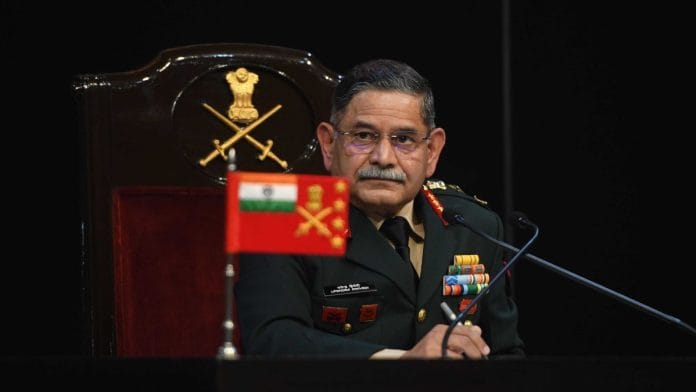New Delhi: While noting that both sides have managed to bring down the tensions at the Line of Actual Control (LAC) and that the situation was sensitive but stable, Army chief General Upendra Dwivedi Monday made it clear that “there is (still) a degree of standoff”.
He also made it clear that the situation is not ripe for any kind of troop cut.
“Troop deployment directly depends on the trust factor (between India and China) and the capabilities have been created on either side. The current capabilities across entails we will need to maintain the troop levels,” Army chief said addressing his annual press conference ahead of Army Day celebrated on 15 January.
Asked specifically, If India was looking at cutting down on troop deployment, he said there is a winter deployment when the total number of troops are reduced and a summer deployment when the numbers increase.
“During winters, we are not looking at reduction in troop-levels along LAC. A review will be done ahead of summers,” General Dwivedi said, adding that it all depends on what kind of meetings have taken place between the two sides and the decisions arrived at.
“We are looking at the next round of talks at the level of the Special Representatives and the WMCC (Working Mechanism for Consultation and Coordination on India–China Border Affairs),” General Dwivedi said.
On the issue of the LAC tensions, he said, “It is stable but sensitive”.
“Coming on to Depsang and Demchok, 20 April onwards, both sides had moved forward and stopped the other side from going to the traditional areas where they were carrying out the patrolling…As far as verification patrolling (is concerned), two rounds have already been completed by both sides over a period of time and both are quite satisfied about it,” he said speaking about the Depsang and Demchok where the two sides have managed to restart patrolling.
He said that Corps and Divisional Commanders have been given the power to decide on small issues like grazing which, he said, has restarted.
He said earlier grazers were being stopped from taking their cattle to traditional spots because India did not want to trigger any untoward incident.
Asked about when patrolling will restart in buffer zones, he said, “There is nothing called a buffer zone…Where you feel that the nature or the degree of violence can be high and the fuse is short, you create some distances.
“So, when we carried out these negotiations over a period of time, some places were declared as a temporary moratorium. It means that both sides will remain back and will not go to the common areas because we still feel that if we meet at those places the violence level may go high…
“After 20 April, the trust between the two countries has to have a new definition. Therefore, there is a requirement for us to sit together and come to a broader understanding of how we want to calm down the situation and restore the trust,” he said.
While India has managed to restart patrolling in Depsang and Demchok, both sides are yet to do so in actual friction points that emerged post April 2020 including in Galwan, Northern banks of Pangong Tso, Gogra and Hot Springs Area.
Also read: Photos taken, GPS logging done, India wraps up first set of patrols in Depsang Plains






